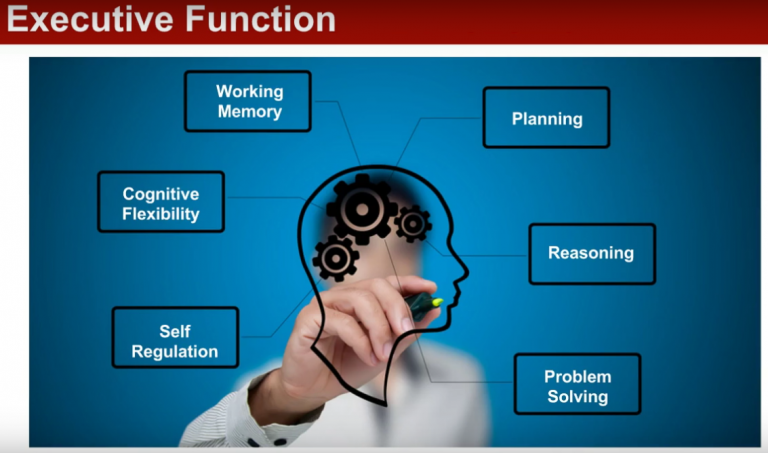The Dilemma of Low Student Engagement
Classrooms have changed immensely over the past few years, from curricular needs, to social and emotional development, to state mandates. A pressing concern looms over classrooms worldwide: the disengagement of students. The correlation between lack of student engagement and low academic achievement has become a prevalent issue, challenging educators to reevaluate their approaches. However, the key to unlocking student potential lies in understanding and nurturing the cognitive processes of executive function. We partner with schools to support educators in understanding the importance of building students’ executive function skills to create more engaging classrooms.

Understanding Executive Function
Executive function encompasses a set of 40 skills, including managing time, paying attention, switching focus, planning and organizing, regulating emotions, and more. All of these are extremely important in learning. These skills are developed in the brain’s prefrontal cortex, which develops from ages 4 to 25. Our sister company, IDE Corp., and president, Dr. Nancy Sulla, teaches us that there are seven categories related to executive function: cognitive flexibility, working memory, inhibitory control, planning, reasoning, problem solving, and self-awareness. Dr. Nancy Sulla states in her book Building Executive Function: The Missing Link to Student Achievement, “We know that executive function skills are necessary for making sense of classroom instruction and that, through targeted experiences, teachers can contribute to the growth of the prefrontal cortex and executive function skills (Sulla, Building Executive Function: The Missing Link to Student Achievement, 2018).” Contrary to common belief, students are not inherently born with fully developed executive function; instead, it is a skill that requires explicit teaching and continuous practice.
Executive function is woven through every aspect of school. To be successful, students need to be able to manage their time, pay attention, change their focus, plan, organize, reflect, and regulate themselves throughout their day. If a principal were to accompany a new student with a fractured arm into the classroom, the teacher would adjust to support the learner in light of the physiological challenge. No educator would advise the student to “try harder” when attempting to reach for an object with a broken arm. Similarly, the expression “try harder” should not be directed at students with an underdeveloped prefrontal cortex. Encouraging a child with memory difficulties to “try harder” proves ineffective and detrimental to the student’s self-perception. Addressing deficits through purposeful activities and structures is more likely to result in increased student engagement within a relatively short time frame (Sulla, Building Executive Function: The Missing Link to Student Achievement, 2018).
On top of the many demands of teachers falls the responsibility for developing students’ executive function skillset. However, many teachers feel unprepared to develop these skills in their learners, and/or feel they don’t have the time. We can help support teachers with understanding the importance of building students’ executive function skills and demonstrate how to weave executive function into their classrooms in order to create more engagement. This will result in raising student achievement. A win, win, win!

The Decline of Student Engagement and Achievement
The Glossary for Education Reform defines student engagement as the “degree of attention, curiosity, interest, optimism, and passion that students show when they are learning or being taught, which extends to the level of motivation they have to learn and progress in their education.” In recent years, a disheartening trend has emerged — a decline in student engagement. What is the root cause behind diminishing engagement levels? Could it be teacher burnout, state mandates, parent pressure, or a combination of this, and more? As technology evolves and distractions multiply, teachers face the challenge of maintaining students’ focus in the classroom.
Consider students deeply immersed in a video game, actively learning to advance through various levels. These involved students exhibit executive function skills such as initiating and persisting in a task, explaining their apparent fascination with the game. They adeptly follow multiple steps to master the game, simultaneously thinking about multiple concepts related to challenges, requirements, scoring, and obstacles. While navigating the game, they can discern similarities and differences, categorize information, and distinguish between helpful and distracting or harmful elements. This cognitive flexibility allows them to successfully navigate the game. These executive function skills of engagement are transferable to any situation where students are fully absorbed (Sulla, Building Executive Function: The Missing Link to Student Achievement, 2018).
Innovation is the key to engagement, not only for our students but for our teachers. However, the big cry from educators is the need for purposeful support. Schools are tasked not only with educating students, but educating teachers as well. There is a lack of knowledge on executive function, the crucial role it plays in the classroom, and how to foster an environment that develops executive function. This drives our partnership with schools to build executive function as the missing link to student achievement.
Are your teachers prepared to engage the next generation of learners? If you are wary of answering this question, we can help! Whatever the need, we have a solution for you! We offer comprehensive support for schools through two different avenues: our Virtual Learning Communities (VLCs) and/or our Professional Learning Experiences (PLEs).
Our Solution to Boost Student Engagement
One innovative solution is providing teachers with the opportunity to join one of our Virtual Learning Communities. These communities offer a lifeline to individual teachers seeking professional development. They are six-weeks, on-demand, and online, which ensures flexibility, while the personalized content aids in advancing teaching skills. Teachers can make the VLCs fit in their own schedules, and they are provided with choices for how and what they learn. This personalized approach has been deemed extremely successful in school districts throughout the country. Teachers also have the chance to meet with one of our expert consultants for one-on-one support throughout their learning journey. We offer these opportunities all through the year, and each session offers a variety of courses. A VLC on executive function is almost always offered, due to the demanding need for professional development on this topic in schools. Two courses specifically being offered in the winter and spring of 2024 are Building Executive Function to Support Student Success and Creating a Climate of Executive Function (click image for course description).
An additional solution for your school staff can be found in our online, on-demand Professional Learning Experiences. Of our current six different PLEs, one of our offerings is Executive Function and SEL: Skills for Life. This PLE explores strategies to build the six levels of executive function skills and SEL competencies they support in order to be successful in school and life. The PLE is a great opportunity for your whole staff to develop professionally in understanding the importance of building students’ executive function skills to create more engaging classrooms.

Create a Culture of Professional Learning
As part of our commitment to revolutionizing education, we invite you to explore our array of school solutions, many of which are geared toward executive function. Create a culture of professional learning with us through 25 hours of Professional Learning Experiences and/or Virtual Learning Communities to foster engagement through executive function in your classrooms. These offerings are designed to empower teachers with the knowledge and skills needed to enhance their teaching styles, with a particular focus on executive function, resulting in improved student engagement.
By fostering engagement within classrooms, we believe we can collectively elevate student achievement. Visit our website today to learn more about these transformative opportunities and take the first step toward a more engaged and successful learning environment. Together, let’s unlock the potential within every student.


 In this course, participants will leverage choice and technology to provide students with the ultimate differentiated learning environment. They will develop differentiated digital activity lists rooted in rigorous instruction that offer multiple ways to learn and apply content. Participants will explore autonomy, purpose, and mastery as motivators in all learning environments. They will design differentiated activity lists to put students in charge of their own learning, creating a structure that allows students to make decisions within a structured framework. Making informed decisions is an essential life skill that teachers can support with intentional classroom practices.
In this course, participants will leverage choice and technology to provide students with the ultimate differentiated learning environment. They will develop differentiated digital activity lists rooted in rigorous instruction that offer multiple ways to learn and apply content. Participants will explore autonomy, purpose, and mastery as motivators in all learning environments. They will design differentiated activity lists to put students in charge of their own learning, creating a structure that allows students to make decisions within a structured framework. Making informed decisions is an essential life skill that teachers can support with intentional classroom practices. Participants in this course will use Reinventing the Classroom Experience by Dr. Nancy Sulla as a resource. The assigned book must be
Participants in this course will use Reinventing the Classroom Experience by Dr. Nancy Sulla as a resource. The assigned book must be